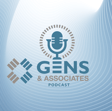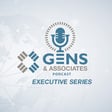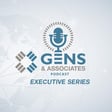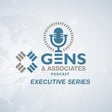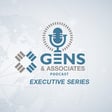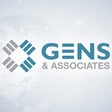Introduction to Podcast and Guests
00:00:07
Speaker
Welcome to the Gens and Associates Regulatory Executive Podcast Series, where we explore innovation and regulatory. Today, I'm happy to be speaking with Steve Owens, CEO and Murali, Chief Revenue Officer of DocuVero.
00:00:22
Speaker
So I've been looking forward to this, gentlemen. We met just, it just seemed like a couple of days ago, but it was in May at the Xtito Conference and got to dig in.
Acquisition and Future Outlook
00:00:33
Speaker
a lot deeper with what you guys are up to and more importantly, where you're going. So that's when I said, we we got to get you on the podcast. There's a lot of great things going on in the DocuVera world. So before we get started, if you could introduce yourselves and the the company for our listeners, that would be great.
00:00:50
Speaker
Awesome, Steve. Thanks. my name is Steve Owens and I am the CEO of DocuVera. I am an engineer and MBA by training, but have focused on building enterprise SaaS services over the last 25 years, the last 20 years working with startups and various small companies.
00:01:07
Speaker
Through the years, I've worked it mainly in the product areas, but also have focused on sales and marketing. Over the last 10 years, I've been with DocuVera and have helped to build the DocuVera structured content and now AI service, which focuses on the pharmaceutical documentation lifecycle.
00:01:27
Speaker
Most recently, we're excited to have been acquired by Bertelsmann as part of their Cormio Digital Health Initiative, which for a startup person, getting acquired is always one of the goals you have in building businesses. So really personally gratifying for myself and also sets up DocuVera for a really terrific future under the Bertelsmann umbrella.
Leadership Backgrounds
00:01:49
Speaker
Merle? Hi, everyone. So my name is Moodley Menon. I'm the Chief Revenue Officer here at Docuvera. Like Steve, I've been with the company around 10 years as well. I have an engineering background as well.
00:02:00
Speaker
And my journey in pharma IT started in technical consulting and sales roles at CROs and system integrators. Today Docuvera, I lead our go-to-market strategy for professional services and sales, helping pharmaceutical companies transform, how they create and manage regulatory content.
00:02:18
Speaker
Thanks for having me on your podcast and I'm excited to share how you're tackling ai in the radio space. Yeah, so let me also introduce DocuVera.
Company Evolution and Industry Focus
00:02:25
Speaker
So to understand the roots of DocuVera, you really need to know a bit about the history of the company.
00:02:31
Speaker
So the company has been around for 23 years, but for most of that time, we've operated a product called AuthorIt. So AuthorIt is more of a traditional tech pub structured content product that excels within industries like aerospace, finance, utilities, and government.
00:02:49
Speaker
So AuthorIt is a very feature-rich product, and it was built for a tech pub's author who would work in that application every day and create very robust structures of documents to produce a very wide range of outputs.
00:03:03
Speaker
When we implemented AuthorIt with a pharmaceutical customer, the medical authors who'd been working in Word for decades really struggled to adopt the service because it required them to think more like a tech pub's author than a medical author.
00:03:18
Speaker
So that's why we built DocuVera. We felt that the structured content market had a lot of potential in the pharmaceutical space, but medical authors really needed a product that was built specifically for them.
00:03:30
Speaker
So we've been offering DocuVera since 2017, and today our platform is being used by clinical writers to create protocols and other clinical documents like report submissions to ct.gov for trial transparency reports.
00:03:45
Speaker
It's being used by regulatory labeling groups to create labels and fire epa EPI submissions. And it's also being used by medical affairs teams to create response documents and various other documents interacting with health care professionals.
00:04:01
Speaker
We also have a number of other pilots and POCs and CMC, PD, quality docs and other use cases. So again, we're really focused on a cross enterprise wide application where content can be used across those different functional areas.
00:04:17
Speaker
We have people working across the United States, Europe and New Zealand. As mentioned, we were recently acquired by Bertelsmann and also we've sold the author of business and are now solely focused on the pharmaceutical sector.
00:04:32
Speaker
Yeah, thanks so much for that background, Steve, because I remember in our early benchmarks, we would be tracking authorit back in the ah in the day. So as we're looking at this sector very, very closely over the 12 months, you know kind of got reintroduced with DocuVera and where
AI and Content Strategy in Pharma
00:04:50
Speaker
you're going. So maybe that's where we'll ah start. Things are rapidly changing. When I look From the time I left Johnson & Johnson you know to a present day, the authoring paradigm has been pretty static. And as as we know, it's a significant change.
00:05:06
Speaker
And I think most would say we're still in the early days of this change. So, Morali, why don't we start with you? How is DocuVera meeting today's needs? And more importantly, we focus on tomorrow's. This thing is going very quick. You guys have a broad brush.
00:05:24
Speaker
um The fast-paced content generation transformation, like I said, is in the the early days. ah You focus on a lot of things, but our listeners really focus a lot on regulatory, clinical, or anything that comes into regulatory, because ultimately it's a submission going to the health authority.
00:05:40
Speaker
So, um yeah, let let our listeners know where this train's headed with Takuvera. Yeah, so thanks for that. So, yes, we are focusing on the platform use case, and we feel that's the way to approach this because, as you know, there's so much cross-reuse, and the ultimate goal for us is to really see how we can shorten the time to market across the the value chain, so to speak. So when you think about DocuVera and the role of AI and how it affects the business, there are a couple of areas that we want to kind of focus on. There are three pillars that we see are very prominent in what we do and very different from how others see us as well.
00:06:18
Speaker
First is the value of reuse. Now, reuse is a very innate nature of structured authoring, right? you have You are writing content, you're writing content for others, you're writing and reusing content from one document that to the other.
00:06:34
Speaker
But in our view, there is a hierarchy of content reuse and creation that helps you to prioritize how content is used in those documents. And this is very, very important to us.
00:06:45
Speaker
So if you are in the new AI paradigm and you want to create content, there is a methodology that we typically follow here at DocuVera. And the first one is, the first priority is use AI to find and reuse already human approved and reviewed content.
00:07:02
Speaker
that is already in the document or in the content repository. Because once the content is reviewed and approved, there is no reason to regenerate it. You know, you don't have to go through the same review cycles that something that is generated by Gen.AI would have to go through, so to speak.
00:07:16
Speaker
In our world, we call this as retrieval augmented reuse or RARE for short. And in that as the name suggests, we are using AI technologies to surface those reusable content so somebody can use it suggestedly in a content, so to speak.
00:07:33
Speaker
yeah if If you dig down deeper, if the reusable content is not available, then you move to the next stage gate, which is where you use AI technologies to find these reusable components that are near similar, right? And this is still valuable because if you can't use 100% of what is already human reviewed and approved, you can potentially use 80% of it, then transform the rest of it to meet your requirements, right?
00:07:58
Speaker
So in this example, should we show the user what has been modified, you know who changed what, et cetera. And because the majority of the content is already re reviewed and approved, you save a lot of time, basically, in the review process. And we call this retrieval augmented transformation, or RAT for short.
00:08:18
Speaker
And when you really get into the generative AI piece of stuff, where if the reuse is not available, if the content can, the near similar content cannot be transformed, then use generative AI to generate new content.
00:08:32
Speaker
And that, you know, that generated content then does go through a human ah review approval process. And this is where we feel we are different, where reuse is still critical to
Governance and Compliance with AI
00:08:42
Speaker
us. if That's not available.
00:08:44
Speaker
Transformations are important. And thirdly, but use Gen.AI. To go back to your point, the other differentiation is we are a platform. We are heavily focused on the governance of the content, the lifecycle management of this content.
00:08:58
Speaker
We are absolutely certain that to implement AI, you still need a governance layer so your content and your process are still compliant and validated. I'll just give you some examples. You still need to be able to clearly distinguish between machine-generated and human-reviewed content, right? In a validated system, that's really important.
00:09:15
Speaker
you and really need to have workflows that have machine-generated first-rack content and reviewed and approved by humans, right? On the export and submission side, you need to be able to you use some of that content to put into various formats and kind and put that content to different work streams and so on and so forth.
00:09:33
Speaker
Permissions is very important. And we all know that in this pharma ecosystem, we have we have large systems and we need to really play nice with each other, right? So having opening APIs or a service layer that kind of integrate with partner technologies, with customer technologies is super important to us.
00:09:52
Speaker
So in summary, the governance is a guardrail that we wrap around the AI, and it's super critical for turning these AI technologies into a solution that can operate within a regulated environment.
00:10:04
Speaker
I think it's all about eliminating manual, repetitive, and low-value tasks, right? Be it tagging the content rightly, searching for the right content, transforming the content the right way.
00:10:15
Speaker
Enriching the content as it comes along, quality checking as we go along, and then basically distribution of this content through advanced technologies is super, super critical. We are building AI tools ourselves, but we are also working with partners and customers who have domain-specific models and tools.
00:10:32
Speaker
And this open technology, the open platform and open governance platform is really what sets us apart. And and we are really aligned to all the regulatory standards that are coming up, and that can be extended through the APIs.
00:10:44
Speaker
So to summarize this, I actually have three points here, the three buckets, because most people think about it as two buckets. And this, for me personally, was a really kind of good education about that that middle bucket. You have your rare, your rat, and and the and the new, but it's it's the one in the middle.
00:11:03
Speaker
that I just don't think there's enough of a conversation about the near similar. And that's some of the beauty of be at the technology. Is it close enough? that I'm going to get it. I'm going to transform it. And I'm still, by doing that, going to significantly reduce time in the authoring.
00:11:19
Speaker
The other thing that I noted here that I really like, because we talk a lot With our clients and our research, we test it because there's a direct correlation with data quality governance practices, the maturity of those and good data quality or good content quality because it kind of starts with that. that That's a foundation on that.
00:11:39
Speaker
So the fact that you have a lot of governance wrapped around your platform, that that's really, really important. And people that get deep into this topic know that that it's not only and important, it needs to be consistent, right?
00:11:53
Speaker
So, and and maybe Steve, this might be a kind of a nice setup for the second know area that we want to explore that there's a lot of stats out there with productivity. We're trying to get a really good handle in our fall research from original goals on transforming the authoring transformation, things like this. And then, you know, through pilots or in production, what you're getting, but you work with a lot of clients and I just wanted to note this and for our listeners, it's available on the DocuVera website, but 82% content reuse, 110% productivity, under 45% ROI achieved.
00:12:29
Speaker
you know These are very, very impressive. And the pilots that we're seeing or even production, there's benefits that if we went 10 years ago, we couldn't even imagine.
00:12:39
Speaker
You know, that we could cut off two, three, four weeks because it's last patient visit database lock to the filing. And then the other side on lifecycle management, usually 70 percent of the cost in regulatory is lifecycle management. And that's a huge optimization opportunity. So.
00:12:56
Speaker
I mean, this technology, and I would also say coupled with the review process, because some organizations, and you probably get this too, that they have so many layers of review, know, kind of on the content for filing. And sometimes that's half the equation.
00:13:10
Speaker
But here's an example where tech is really, really exciting. So ah with that, Steve, we've seen the debate, structured content authoring versus it's an or and or. And I think, you know, people are settling in. You need better structure for the AI to be more intelligent. And again, this ah near similar content, people aren't talking about it enough.
00:13:31
Speaker
But what you see and what ultimately kind of is more value. And can you talk more about some of the business benefits further that your customers are getting? So I think that's a good question. um You know, looking at what's more valuable, ai versus structured content, the way that we look at it is it's really not, we you really shouldn't evaluate those technologies in isolation because the combination of AI and structured content is is really what we see as the major benefit.
00:14:00
Speaker
So in short, structured content makes AI better. So as Murley said a previous example, you can use AI to find existing human-reviewed content from a structured authoring system like DocuVera, and that's much better than generating the content over and over using Gen AI.
00:14:19
Speaker
So... That's one example. Another example, as Merle mentioned, is the governance layer. So you need to have that governance layer in order to operate an AI system within a regulated environment like pharma.
00:14:32
Speaker
So you need things like audit trails, review and approval workflows, publishing modules, ah permissions, ecosystem integrations, platform validations. All of those elements are required in order to operate an AI system, a real AI solution within pharma.
00:14:50
Speaker
And systems like DocuVera can offer that governance layer. the The third point here, and Steve, you mentioned this earlier, is AI operates much better when it's working with well-structured content that is tagged very well.
00:15:06
Speaker
So using structured content tools to migrate your unstructured content into a system like DocuVera, having that content then componentized, AI sitting on top of DocuVera is just going to operate a lot better because, again, that content is well-structured and it's well-tagged.
00:15:26
Speaker
So the bottom line is AI is much improved by using structured content. The reciprocal is also true. So AI will make structured content better. So as Marley mentioned, you can use AI to to generate a paragraph of information that is based on existing components within your system and is aligning to writing guidelines and regulatory guidance.
00:15:54
Speaker
And that's much easier to use that using a language model versus writing that content manually. I'm really also mentioning content integrity tools. Doing the first pass of a review using these content and these AI-based content integrity tools is a much, again, more efficient way to spot potential errors and omissions than reviewing that document manually.
00:16:17
Speaker
So AI is making structured content a lot better as well. So from our perspective, we really believe you can't have one without the other. It's the combination of structured content with AI that gives customers an efficient documentation system with the compliance necessary, again, to operate within a regulated pharma industry.
00:16:40
Speaker
So, Steve, I have my business benefit cap on when you're talking, and let me test things out. Because, you know, when any kind of business benefit, you know com it's always a combination of technology and process, or enlighten in this case, the review cycle process, that you get a certain ah ROI. But really what I'm hearing that...
00:16:59
Speaker
It's almost like a curve on the ah ROI here because as you can transform more existing content into better structure, you have a higher degree of reuse. And I really like it how you explained it. They complement each other. It's bidirectional, right?
00:17:16
Speaker
So the more over time, the more structure you have and the AI is getting smarter as usually we say year by year, it's almost minute by minute, you know, in this paradigm, it's almost an exponential curve on the business return over the course of a couple of years. And to my point, it's it's still early days on this.
00:17:36
Speaker
So, um yeah, I don't know if you have a kind of reaction to that because there's static business benefits once you achieve it. But this seems like it's continually incremental benefits as the structure and the AI learning gets deeper and deeper.
00:17:49
Speaker
Yeah. Again, I think that's a great point. and And the way I think we look at it is is it's really almost exponential benefits. Right. So. you see significant benefits in efficiency and productivity, right? You see significant benefits in reduction of time to market, improved quality and reduction in errors and emissions.
00:18:09
Speaker
If you just look at the the cost that's going to go into transforming documents into digital submissions, that's a huge cost avoidance that structured content and AI will address.
00:18:23
Speaker
And that also benefits not only the cost side of the equation, but also time to market and reductions in errors and emissions. So that, you can say, is very significant when you're looking just within a specific use case. So if you take labeling, for example, we've had customers of ours who've done ROI analysis, and that is very significant that the impact that structured content will have in in those particular areas.
00:18:52
Speaker
Now you do what you just said, you layer AI on top of that, which reduce reduces a lot of the the manual nature associated with structured content. And then the exponential part of the equation kicks in when this is now operating more and it on an enterprise-wide basis.
00:19:10
Speaker
So when you can start to link your clinical information with your regulatory information, and then that feeds down into PV or CMC or feeds down into medical affairs, you just continue to drive more and more value across the board.
00:19:26
Speaker
So i am incredibly excited with what the potential is of what we're doing around structured content, around AI, especially as it it then gets applied across various use cases within an enterprise.
Structured Content and AI Benefits
00:19:40
Speaker
And I love that labeling use case. And that's the classic one going back to when the PIM initiative almost happened. You know, this was kind of the big thing. So, Steve, i'll ah before we shift to the next question, yeahll I'll appeal to your engineering background and size, because a lot of times when I look at Labeling, and it's more the lifecycle management of it. So there's safety signal happens and it alters. There's a label change.
00:20:05
Speaker
For a large multinational, that might be in 150 markets and it might be four or five product family. So if you think about it from a mathematic and a permutation standpoint, the permutations just on those chunks of the label,
00:20:20
Speaker
are significant, but if you have it down to that granular paragraphs or pieces of the content, you just flatten that permutation and get a massive benefit. So just a little side thing on my observation with the label reuse case, as this stuff gets more mature, especially on the lifecycle management, that's going to be a massive, massive productivity enabler in our opinion.
00:20:42
Speaker
We completely agreed. When we first started talking to the the regulatory teams, just their situations when they weren't aware of of any of the potential nonconforming non-conforming content across the hierarchy of their labels.
00:21:00
Speaker
And when we first started looking at that from a structured content perspective, that was one of the benefits that we provided is you now can link all these components And you can have very good visibility on how the content essentially flows down through your tree of labels.
00:21:16
Speaker
Again, you layer AI on top of that, you now have not only this really good visibility into how content at the various levels of the label ah align with the core information, but then you have the capabilities, as you described, of automatically propagating that content down to the various levels, doing a lot more automation with how you transform that content as it's getting to the various regions based on patterns that have been established through various language models.
00:21:46
Speaker
So it just really is incredibly exciting with as you're describing, the opportunity for us to to make this process just so much more efficient than what has traditionally existed.
00:21:58
Speaker
Yeah, a very manual process. Absolutely. Yeah, it's true just to add to Steve's point, I mean, one thing that does not get a lot of attention is really the the translation side of things as well, right? Yeah, yeah.
00:22:10
Speaker
You have conformity and nonconformity. That's absolutely true, right? Your deviation from your core label to your local label, that's big benefit. But translations, think about it, right? You have a core position that needs to be translated in the EU for in 27 languages.
00:22:26
Speaker
Just the consistency across that through structured authoring principles where you're not basically sending it out and having it translated, having all kinds of issues. But then one shot translating that into multiple languages is a huge, huge efficiency boost.
00:22:40
Speaker
Clear, consistent message. Legal language is the same. You're reviewed it once. The translated information is tied to your source content. So anytime your source content changes, your translation gets updated as well.
00:22:52
Speaker
ah That was never possible before. And just to add to Steve's point, now you apply it to an AI lens where your language models are really sophisticated now. You can pretty much speak any language in the world if you think about it, right? So applying that kind of a language model on top to kind of drive these translation processes is a huge, huge paradigm shift.
00:23:14
Speaker
And I would add to your point, it's not the efficiency at ah time, but like when you're introduced, and I'm glad you brought up the translation things, it's the cost. Like we've always wondered you here at Guns & Associates because, you know, back in the day, the translation software wasn't that sophisticated. You couldn't really rely on it. So you're outsourcing everything, right?
00:23:33
Speaker
If you summed up just in life sciences, right? then The cost of translations, I just don't even know what that number would be. Now, unfortunately for that industry, this is going to be quite disruptive on it. So there there's a massive cost just on translations just for a single large multinational company. So...
00:23:52
Speaker
So I really glad you brought that up because you were expanding this conversation more to the end to end processes. There's the review, there's the tech, there's the translations. And each one of those are time consuming. And yeah usually in the history, yeah optimize one or two. But this is the first time ever we're optimizing the whole thing. You know, so it's it's it's really exciting.
00:24:13
Speaker
So, Merle, I want to ask you, usually we're saying what what's going on the near and the future, maybe two or three years out. But I can't ask that because this is happening really, really quickly. You know, the competition is really heating up because even Greg and I, as we are really examining the space for a client about three to four months ago, we had to go to Steve, to your point, through that education process. You can't look at it. just We just want structured content authoring solution. You have to have kind of what you described.
00:24:42
Speaker
that wider view. So what should we expect from DocuVera in the near future? Will it be later on this year, getting into next year, because it's it's changing
Focus on Usability and Platform Expansion
00:24:50
Speaker
so quickly? like Yeah, I mean, i think the key here is the AI space is really evolving very fast. And I think one thing is clear for DocuVera, and it's true for many of our peers as well, is ah It is an AI first world, right?
00:25:06
Speaker
And it is an AI to lead world, so to speak. But with that comes, as we say, right, it has to be measured, right? At what cost and how do we kind of ah rationalize it across what we're trying to do is where we are focused on, right? So I'll give you some examples where we feel where this will be really game changing and where we are headed in the in the next few years.
00:25:30
Speaker
We've always founded DocuVera on the principles of ease of use, right? That's been very critical to us. If you look at products in the market, be it XML products or word-based products, we really want our SMEs to focus on what they do best, which is knowledge and scientific knowledge and scientific writing, right?
00:25:50
Speaker
And And for us to keep doing that in a very efficient manner, we have to give them the tools that are easy to use and very similar to the way they are doing the work. But it's also mind-shaped, right?
00:26:02
Speaker
If we are to realize the whole digital shift paradigm, right? For example, ICHM 11 is promising and is going towards a fully digitalized protocol, right? So what's the relevance of DocuWare in that space or any kind of authoring tool in that space is something that we are very focused on, right?
00:26:22
Speaker
So ease of use is primarily very important. That's where we will be focusing a lot of our effort, right? The other thing, as I described, when we talk about AI, it's really around that hierarchy of use, reuse first, transformations, and then Gen AI. I think that's going to be super critical ah so that the value is brought forward to the customer.
00:26:41
Speaker
So the other area we're focused on is the enterprise platform and the configuration layer space, right which is where we're saying we need this platform to go across the enterprise so that we can realize the value chain.
00:26:53
Speaker
And then the last thing is key is, which we probably didn't talk a lot, is change management, right? Structured authoring is a very different way of working. And it is something that companies need to focus on. it is something that all these good ideas and elements needed to be need to be successful. They're also best practices involved in deploying structured authoring and AI solutions. So that's a very key area. And that's a very, it's going to be a key area for us to focus on.
00:27:18
Speaker
into how to make these change management aspects much more clearer and much more easier for adoption, so to speak. don't know, Steve, if you would like to add anything else on top of that. Now, just that, again, and I think you said this too, Steve, that before, two years ago, when AI was not necessarily...
00:27:38
Speaker
well understood or quite frankly popular, and we were out there focused on structured content, the opportunity to look really interesting to us. Because again, a lot of the efficiencies that we talk about today is based on just having structured content.
00:27:54
Speaker
I just feel like now when you take that AI layer and you put it in on top of structured content, as we talked beforehand, it just really, that we really see exponential growth in the business as well as the opportunities. And it's just really exciting, um you know, and across many industries, but specifically for pharma and within the documentation space that we're operating.
00:28:19
Speaker
So I think there's just really tremendous opportunities moving forward. Yeah, it's really gone from the early days of the XML editor where people were nervous. It's not words. There wasn't an embracement, especially on the medicinal side, because the author wasn't getting the benefit. The benefit was downstream. Now, maybe a conversation for another time. The medtech side is different because it's more of an engineering paradigm than the...
00:28:45
Speaker
biopharmaceutical side. And the other thing too, that's exciting and and it's clear in our benchmarks and we work with our clients because different strategic initiatives where companies are trying to get value, you might have 30 or 40% at any one year. and there was a massive thing that we tracked about you know, rim modernization, some people call it transformation, and just how global regulatory information management is managed. So that was basically the last eight or nine years.
00:29:14
Speaker
But, you know, it's rare and it's happening in this space. It's not like, hey, you have 30 or 40% working on it. Like just if we talk about the top 30, every single company is working on the authoring. It's all, it's not some or many, it's all. So,
00:29:30
Speaker
So certainly a lot of exciting times, your phones and emails must be quite busy with a lot of interest, a lot of demos, client pilots. So our listeners might want to get a hold of you. So what's the best way? Is that email? Myself, I'm a LinkedIn junkie, you know, website. So what would you suggest?
00:29:50
Speaker
Yeah, so the best way to reach out to us is through our website. And that's the easiest way to kind of reach out. And we'll be glad to help you. All right. And for our listeners, you know how to get hold of us. If you actually have a question, just go to our website on the contact form or certainly look myself up on LinkedIn.
00:30:10
Speaker
Stephen Merley, thank you so much again. i was looking forward to this. I certainly have learned a lot today, and especially at that that middle layer about the near content and the transformation of that. and That was a really beneficial conversation. So thank you so much. And This train is a bullet train and going very quickly. So maybe next summer, we'll have you back on and see where DocuPair is at.
00:30:33
Speaker
So thank you very much. Thank you, Steve. Thanks for having us.



